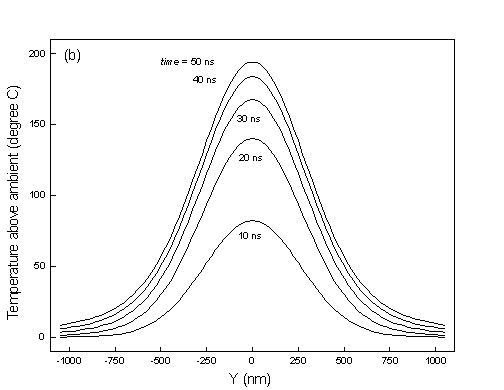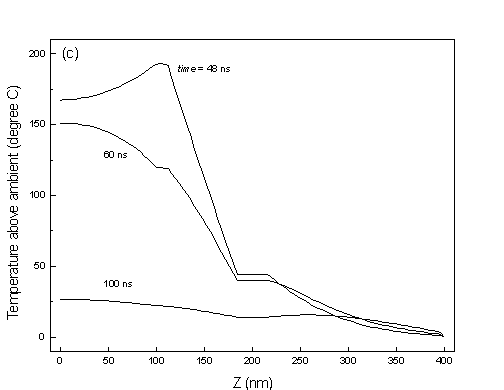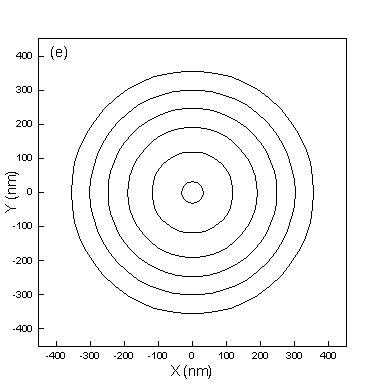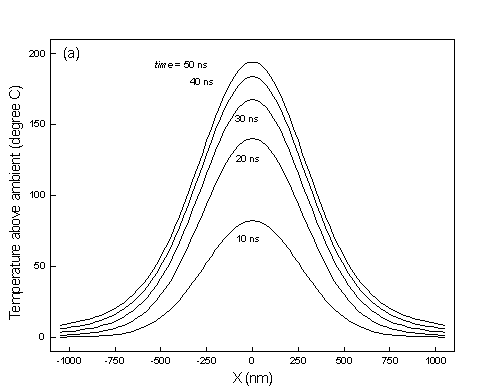 |
Example
1: Quadrilayer Magneto-optical Disk
Simulated in this example is a quadrilayer stack consisting
of a plastic substrate coated with a 32 nm-thick layer of aluminum, a
72 nm-thick layer of SiO2, a 12 nm-thick layer of magnetic
film, and another 100 nm-thick layer of SiO2.
The
Gaussian laser beam is incident on the stack from the surface side, its
1/e radius being 350 nm. The laser pulse shape is trapezoidal, having
60 nsec duration, with 10 nsec rise and fall times.
Calculated
profiles of temperature versus x, y, z, and time
are shown in Figures (a)-(d). Figure (e) shows the isotherms within
the magnetic layer.
Shown
below is the file TR01.SYS, which contains the structural parameters of
the multilayer, the laser beam profile, and the mesh parameters. The filename
extension .SYS stands for "system." This text file (originally
created by TEMPROFILE) can be modified by the user, and may be subsequently
imported to the program.
!@@@@@@@@@@@@@@@@@@@@@@@@@@@@@@@@@@@@@@@@@@@@@@@@@@@@@@@@@@@@@@@@@@@@@@@@@#
! @@ TEMPROFILE 5.0 File TR01.SYS @@ #
! @@ Date: 12/31/1998 Time: 18:34 @@ #
! @@@@@@@@@@@@@@@@@@@@@@@@@@@@@@@@@@@@@@ #
! #
! Notes: Quadrilayer stack used in the surface-incidence configuration #
! of Test Run 1. The incident beam has a Gaussian profile. #
! #
!!!!!!!!!!!!!!!!!!!!!!!!!!!!!!!!!!!!!!!!!!!!!!!!!!!!!!!!!!!!!!!!!!!!!!!!!!#
$ #
Top/Bottom incidence: T #
$ #
Substrate's index (n,k): 1.4600000 .00000000 #
Thermal constants (C,K): 1.7000000 2.00000000E-03 #
$ #
Number of layers: 4 #
$ #
Layer 01: Thickness,n,k: 32.000000 1.2000000 6.9000000 #
C,K: 2.7000000 2.4000000 #
$ #
Layer 02: Thickness,n,k: 72.000000 1.5000000 .00000000 #
C,K: 2.0000000 1.50000000E-02 #
$ #
Layer 03: Thickness,n,k: 12.000000 3.1000000 3.5000000 #
C,K: 2.6000000 .16000000 #
$ #
Layer 04: Thickness,n,k: 100.00000 1.5000000 .00000000 #
C,K: 2.0000000 1.50000000E-02 #
$ #
Heat loss factor (GAMMA): .00000000 #
$ #
Incident beam profile: Gaussian #
Lambda,R0: 632.80000 350.00000 #
Impulse: POWER,TAU,NSTEP: 1.0000000 1.0000000 5 #
$ #
Mesh: RMAX,DLTAR: 2000.0000 25.000000 #
ZMAX,DLTAZ: 400.00000 4.0000000 #
TMAX: 100.00000 #
!@@@@@@@@@@@@@@@@@@@@@@@@@@@@@@@@@@@@@@@@@@@@@@@@@@@@@@@@@@@@@@@@@@@@@@@@@#
|
The
file TR01.PLS shown below contains the laser pulse shape. (The extension
.PLS stands for "pulse.") Pairs of points (t, P)
at the corners of the piece-wise linear function P(t), initially
entered from the keyboard, are saved in this file. The user can modify
the contents of this file with a text editor, and import it to the program
environment during subsequent runs of TEMPROFILE.
!@@@@@@@@@@@@@@@@@@@@@@@@@@@@@@@@@@@@@@@@@@@@@@@@@@@@@@@@@@@@@@@@@@@@@@@@@#
! @@ TEMPROFILE 5.0 File TR01.PLS @@ #
! @@ Date: 12/31/1998 Time: 18:34 @@ #
! @@@@@@@@@@@@@@@@@@@@@@@@@@@@@@@@@@@@@@ #
! #
! Notes: Trapezoidal pulse shape of the laser beam. The rise and fall #
! times are 10 nsec each, and the total pulse width is 60 nsec. #
! #
!!!!!!!!!!!!!!!!!!!!!!!!!!!!!!!!!!!!!!!!!!!!!!!!!!!!!!!!!!!!!!!!!!!!!!!!!!#
Point on pulse (t,P): 10.000000 2.0000000 #
Point on pulse (t,P): 50.000000 2.0000000 #
Point on pulse (t,P): 60.000000 .00000000 #
Point on pulse (t,P): 100.00000 .00000000 #
!@@@@@@@@@@@@@@@@@@@@@@@@@@@@@@@@@@@@@@@@@@@@@@@@@@@@@@@@@@@@@@@@@@@@@@@@@#
|

(a,b)
Plots of temperature versus x and y at z = 108 nm computed
in Example 1. Since the incident beam is circularly symmetric and
does not move relative to the multilayer stack, the temperature profiles
along X and Y are identical.

(c)
Temperature versus z at (x, y) = (0, 0) at several instants
of time.

(d) Temperature
as function of time at z = 108 nm

(e)
Isotherms in the XY-plane at z = 108 nm and time = 50 ns,
as computed in Example 1. The hottest spot at the center has temperature
T = 194.13�C (above ambient). The plotted isotherms, starting
in the middle and moving outward, correspond to T = 193�C, 180�C,
160�C, 140�C, 120�C and 100�C.

Home
| About MM Research, Inc. | Online
Publications
Diffract
| SIM 3D_Max | Multilayer
| Temprofile

© Copyright
1987-2011, MM Research, Inc.
5748 N. Camino del Conde, Tucson, Arizona 85718
|

![]()

